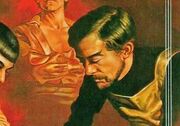- For other uses, see Krenn.

Krenn.
Krenn was a 23rd century Klingon man. Due to the secrecy of politics associated with holding court with Klingon lines and the dominant Great Houses, very little information about Krenn's life is verifiable. Ostensibly, he was an officer in the Klingon Navy, with heritage as a "fusion", the genetically damaged Klingons prevalent in the late 22nd and early 23rd centuries.
Krenn's life came into the spotlight of Federation popular culture when novelist and historian J.M. Ford learned of Krenn's life and wrote The Final Reflection, a book that had Krenn as the central character in a dramatization of early 23rd century Klingon politics. The book was a dramatic retelling of the controversy of the Klingon delegation to a Federation conference in the 2240s decade. Since Ford interviewed many personalities involved in those events, including Emanuel Tagore, a friend of Krenn's, a great deal of the information may bear some degree of truth. Spock, who is described as meeting Krenn in the novel, has stated that the meeting did in fact occur, but that the details are fiction.
Biography[]
In the text, he was born with the name Vrenn, as an orphan without a family line. The novel follows Vrenn's career. He was adopted by Thought Admiral Kethas epetai-Khemara from House Gensa, a "House of Lineless Youth". Kethas told Vrenn that he was the last survivor of the line Rustazh, though this was later revealed to be incorrect. Kethas took Vrenn in the memory of his supposed father, Kovar.
As he had no living children of his own, Kethas made him Vrenn Khemara, sole heir to the House Khemara on the condition that he forget his Rustazh lineage. In the novel's dialogue, Vrenn replied "I was never Rustazh until now... but now I am already Khemara"
The narration continued as Vrenn Khemara served his cadet cruise on the IKV Blue Fire under Squadron Leader Kodon, raiding Romulan space. A brawl found him unexpectedly promoted to the bridge crew, and a promising career was born... until it became clear that his connection with Kethas put him in danger.
Quickly, he was promoted to command of a scout ship on "the frontier" to get him out of the way of politicking, and took the line-name Rustazh as "... it was free to use", according to the book's narration.
Krenn tai-Rustazh quickly developed a reputation as a brave and strategic captain, and was selected to lead a mission to pick up the first Federation Ambassador to the Klingon Empire, Emanuel Tagore, with whom he and his command crew developed a friendship.
Five years later, Krenn took Tagore back to the Federation, at a time when the Federation looked as if it was about to break apart. Krenn represented the Empire at a conference known as a Babel. He was instrumental in revealing a military plot by some Starfleet officers to trigger a war with the Empire, with fear of Klingon conquest as a means to keep the Federation together.
In his time at the conference, Krenn played chess with a young half-Vulcan named Spock. In the text of the novel, Krenn thought "that one is worthy of the stars", regarding the young Vulcan. (TOS - Worlds Apart novel: The Final Reflection)
